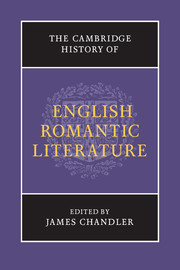Book contents
- Frontmatter
- Introduction
- Part I The Ends of Enlightenment
- Part II Geographies: The Scenes of Literary Life
- 5 London in the 1790s
- 6 Edinburgh and Lowland Scotland
- 7 Romantic Ireland: 1750–1845
- 8 France, Germany, America
- 9 The ‘warm south’
- 10 Country matters
- 11 Romanticism and the wider world: poetry, travel literature and empire
- 12 The homes of England
- 13 Writing, reading and the scenes of war
- 14 Regency London
- Part III Histories: Writing in the New Movements
- Part IV The Ends of Romanticism
- Chronology
- Bibliographies
- Index
- 1 A New Pocket Map of the Cities of London and Westminster; with the Borough of Southwark, Comprehending the new Buildings and other Alterations, 3rd edn (London: William Faden, 1790).">
- References
11 - Romanticism and the wider world: poetry, travel literature and empire
from Part II - Geographies: The Scenes of Literary Life
Published online by Cambridge University Press: 28 May 2009
- Frontmatter
- Introduction
- Part I The Ends of Enlightenment
- Part II Geographies: The Scenes of Literary Life
- 5 London in the 1790s
- 6 Edinburgh and Lowland Scotland
- 7 Romantic Ireland: 1750–1845
- 8 France, Germany, America
- 9 The ‘warm south’
- 10 Country matters
- 11 Romanticism and the wider world: poetry, travel literature and empire
- 12 The homes of England
- 13 Writing, reading and the scenes of war
- 14 Regency London
- Part III Histories: Writing in the New Movements
- Part IV The Ends of Romanticism
- Chronology
- Bibliographies
- Index
- 1 A New Pocket Map of the Cities of London and Westminster; with the Borough of Southwark, Comprehending the new Buildings and other Alterations, 3rd edn (London: William Faden, 1790).">
- References
Summary
‘Dear Mamma, only think, my cousin cannot put the map of Europe together – or my cousin cannot tell the principle rivers in Russia – or she has never heard of Asia Minor … How strange! – Did you ever hear of anything so stupid.’ Such is the exasperated response of the Bertram sisters to their ‘poor relation’ Fanny’s geographical ignorance, in Jane Austen’s 1814 novel Mansfield Park, illustrating the degree to which the new European ‘planetary consciousness’ had permeated the educational expectations of polite Regency females. Of course, as a wide range of recent critics have argued, the Bertram household had a particular investment here, given that their family wealth depended on the exploitation of chattel slaves in the West Indian sugar colony of Antigua. Mansfield Park’s well-documented silences and ellipses concerning colonial slavery fail, as Katie Trumpener has shown, to disguise Austen’s support for abolition of the slave trade, if not for the manumission of slaves. By the same token, the novel’s moral condemnation of ‘absenteeism’ at home or abroad appeals to a new spirit of enlightened trusteeship in Britain’s colonial transactions.
Austen here overrides her family connections with Warren Hastings, former Governor-General of British Bengal and arch-exponent of the bad old colonial practices which are seen to have lost Britain her first empire. In an indirect way her appeal also aligns itself with Edmund Burke’s denunciation of Hastings’ ‘geographical morality’ (Burke’s own phrase) in employing the techniques of ‘oriental despotism’ to govern British India in the previous decade.
Keywords
- Type
- Chapter
- Information
- The Cambridge History of English Romantic Literature , pp. 271 - 292Publisher: Cambridge University PressPrint publication year: 2009



